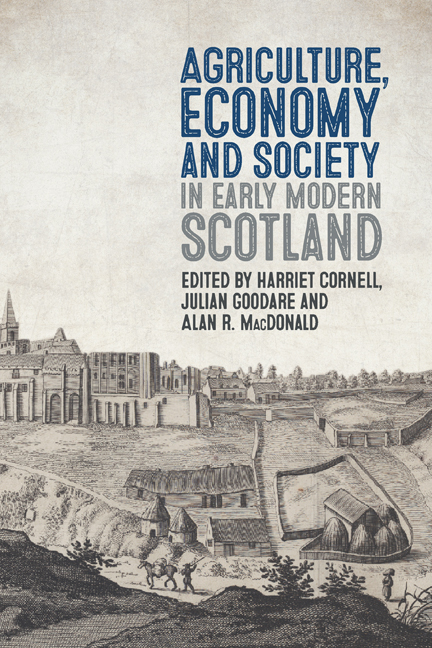Book contents
- Frontmatter
- Dedication
- Contents
- Illustrations
- Contributors
- Acknowledgements
- Note on Currency and Measures
- Abbreviations
- Map of Scotland
- Introduction: Exploring Scotland’s Agricultural History
- 1 Imagining Scottish Agriculture before the Improvers
- 2 The Use of Dykes in Scottish Farming 1500–1700
- 3 The Famine of 1622–23 in Scotland
- 4 Weather and Farming through the Eyes of a Sixteenth-Century Highland Peasant
- 5 Stock, Fermes, Mails and Duties in a Midlothian Barony 1587–89
- 6 The Roots of Improvement: Early Seventeenth-Century Agriculture on the Mains of Dundas, Linlithgowshire
- 7 ‘God Knowis my Sleipis ar Short and Unsound’: Andro Smyth’s Collection of Rent, Tax, Teind and Tolls in Shetland c.1640
- 8 Farming in the Stirling Area 1560–1750
- 9 What Were the Fiars Prices Used For?
- 10 Agriculture and Banking in Eighteenth-Century Scotland 1695–1750
- 11 Capitalism’s Cradle? Ideas, Policies and the Rise of the Scottish Economy in the Mercantilist Age 1600–1800
- Conclusion: A Historiographical and Bibliographical Overview
- Index
- Boydell Studies in Rural History
3 - The Famine of 1622–23 in Scotland
Published online by Cambridge University Press: 14 May 2024
- Frontmatter
- Dedication
- Contents
- Illustrations
- Contributors
- Acknowledgements
- Note on Currency and Measures
- Abbreviations
- Map of Scotland
- Introduction: Exploring Scotland’s Agricultural History
- 1 Imagining Scottish Agriculture before the Improvers
- 2 The Use of Dykes in Scottish Farming 1500–1700
- 3 The Famine of 1622–23 in Scotland
- 4 Weather and Farming through the Eyes of a Sixteenth-Century Highland Peasant
- 5 Stock, Fermes, Mails and Duties in a Midlothian Barony 1587–89
- 6 The Roots of Improvement: Early Seventeenth-Century Agriculture on the Mains of Dundas, Linlithgowshire
- 7 ‘God Knowis my Sleipis ar Short and Unsound’: Andro Smyth’s Collection of Rent, Tax, Teind and Tolls in Shetland c.1640
- 8 Farming in the Stirling Area 1560–1750
- 9 What Were the Fiars Prices Used For?
- 10 Agriculture and Banking in Eighteenth-Century Scotland 1695–1750
- 11 Capitalism’s Cradle? Ideas, Policies and the Rise of the Scottish Economy in the Mercantilist Age 1600–1800
- Conclusion: A Historiographical and Bibliographical Overview
- Index
- Boydell Studies in Rural History
Summary
It is altogether possible it is the worst example of a subsistence crisis in the entire seventeenth century.
Michael Flinn identified the famine of 1622–23 as a severe demographic crisis. Flinn's assertion that the 1622–23 famine was a national catastrophe is backed by Karen Cullen, in her benchmark study of the betterdocumented 1690s famine. Yet there is still no nationwide study of the 1622–23 famine's impact, its human cost to Scotland. This chapter sets out to increase our understanding of a disaster which, even in academic circles, has often been overlooked.
The primary task is to quantify the severity of the famine and its death toll. Few burial registers of the time have survived, but a greater number of baptismal registers exist, and these are crucial to the analysis that follows. The kirk session minutes of several parishes provide qualitative data, and occasionally further quantitative data. The importance of qualitative data in distinguishing periods of ‘dearth’ and scarcity from true famine cannot be overestimated. While price statistics highlight a period of dearth, as we shall see, the kirk session minutes provide individual human details – such as a poor family seeing three of their children die in little more than a month.
An examination of the attempts made by local and central authorities to alleviate the disaster will ask: were enough measures taken in time to minimise loss of life? And I will briefly look at the causes of famine, both actual and perceived. What exactly did happen, and what did those living through the disaster assign as the cause?
* * *
In September 1621, John Lauder, minister of the small rural parish of Tyninghame in East Lothian, warned his congregation that ‘the present [time was] threatening great dearth and famyne’. Lauder was a local man, his father had been a bailie of Tyninghame, so he knew the area, the topography, the people and the regional climate. He knew that harvest failure was imminent and famine would soon be upon his congregation. It was a famine which Lauder attributed partly to the sins of his congregation: ‘God had punished the pepill’ for their sin and absenteeism from the kirk on the Sabbath day. A month before, Lauder had called his parish to fast and seek God's forgiveness. Henry Charteris, minister of North Leith, had also called for a regional period of fasting.
- Type
- Chapter
- Information
- Publisher: Boydell & BrewerPrint publication year: 2024



